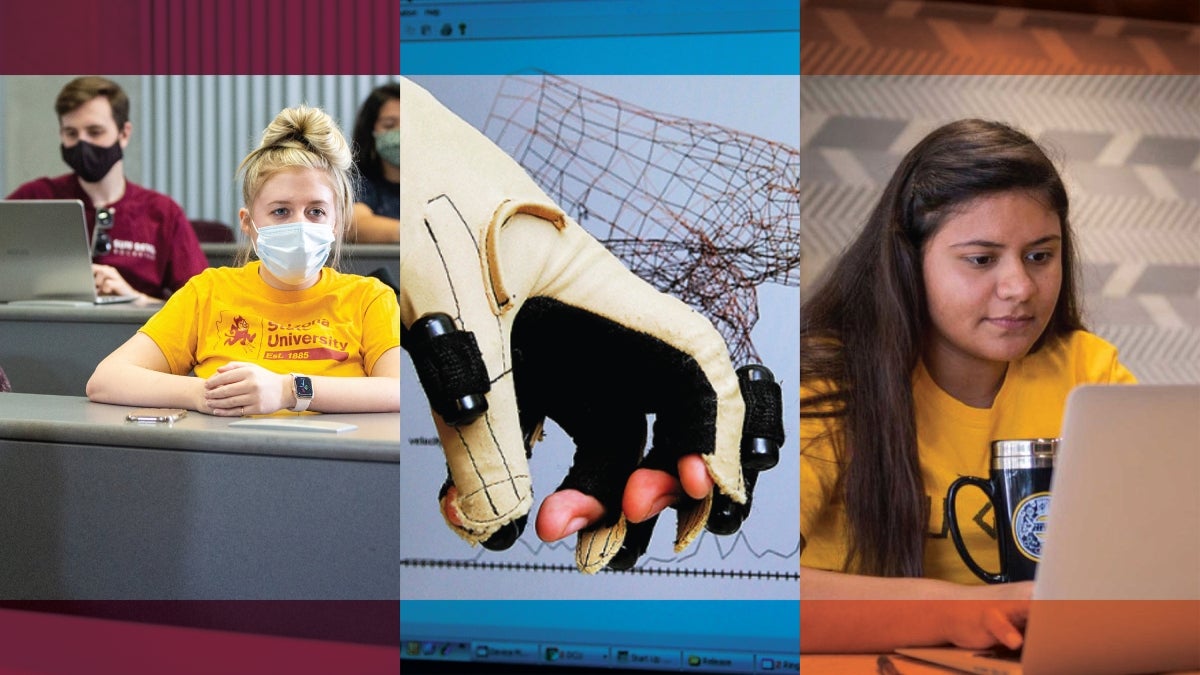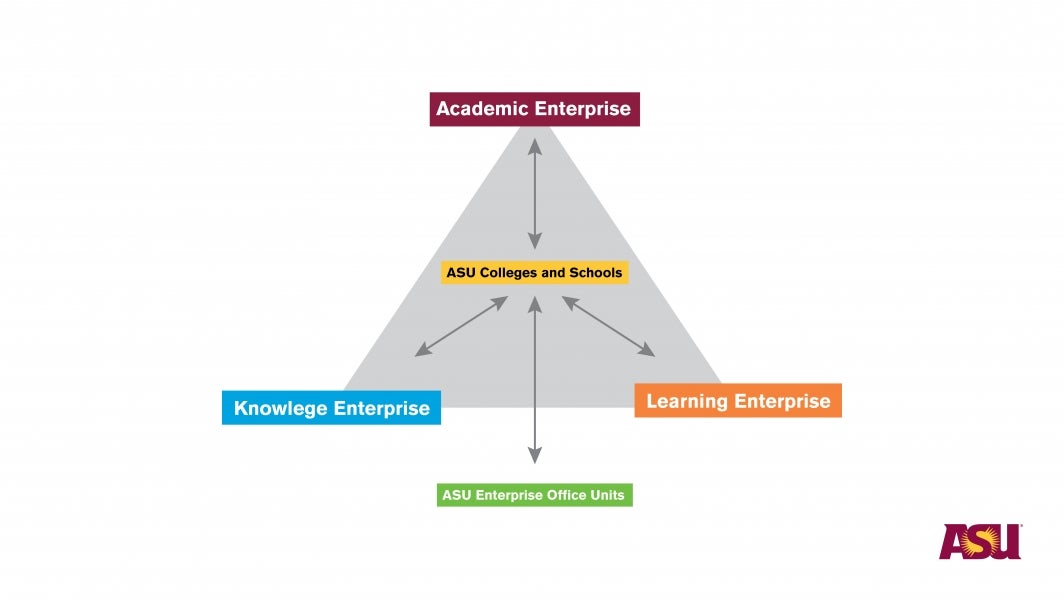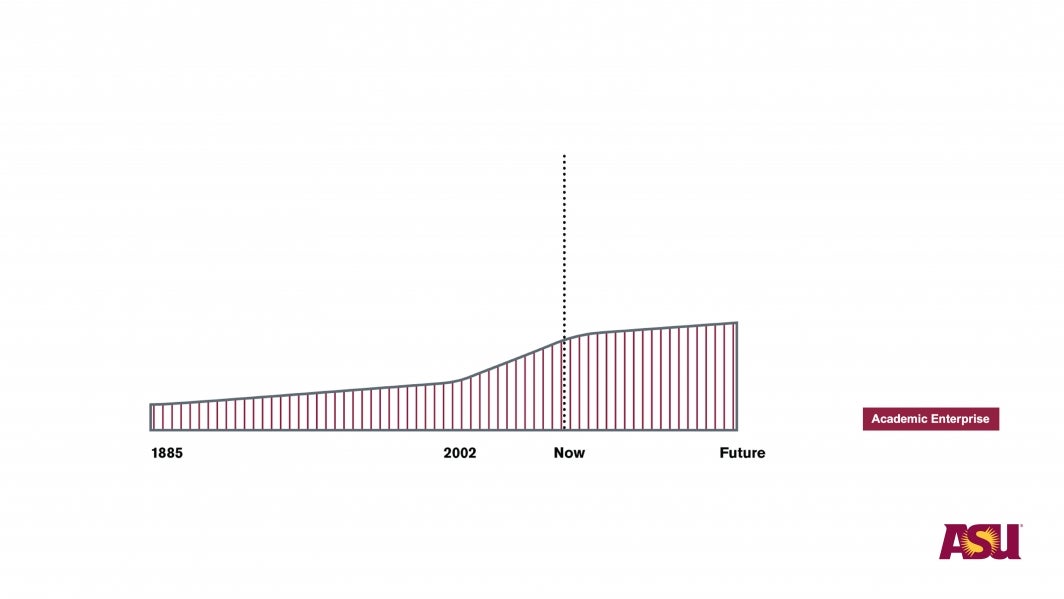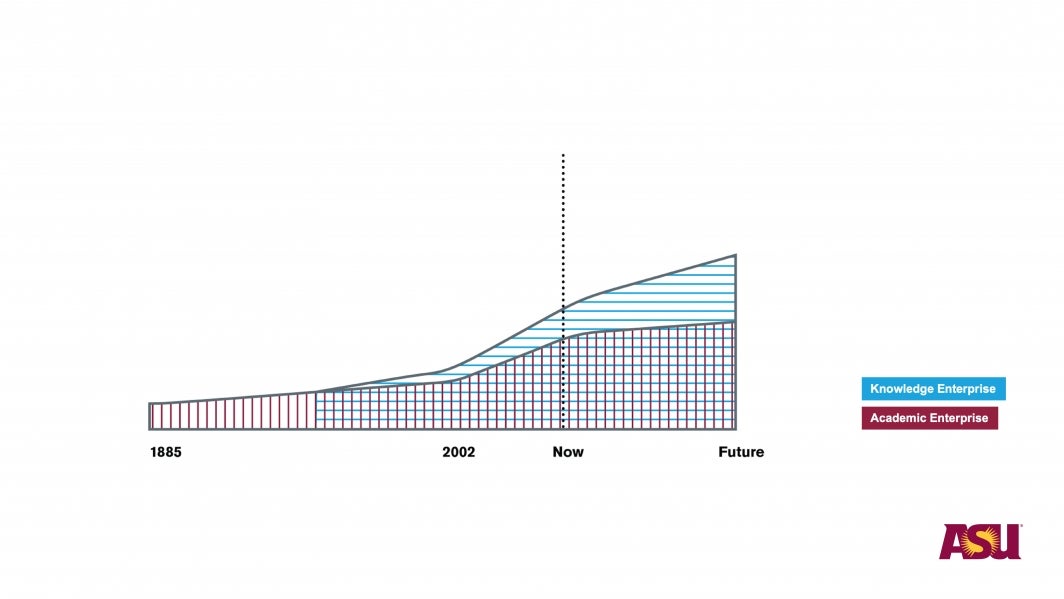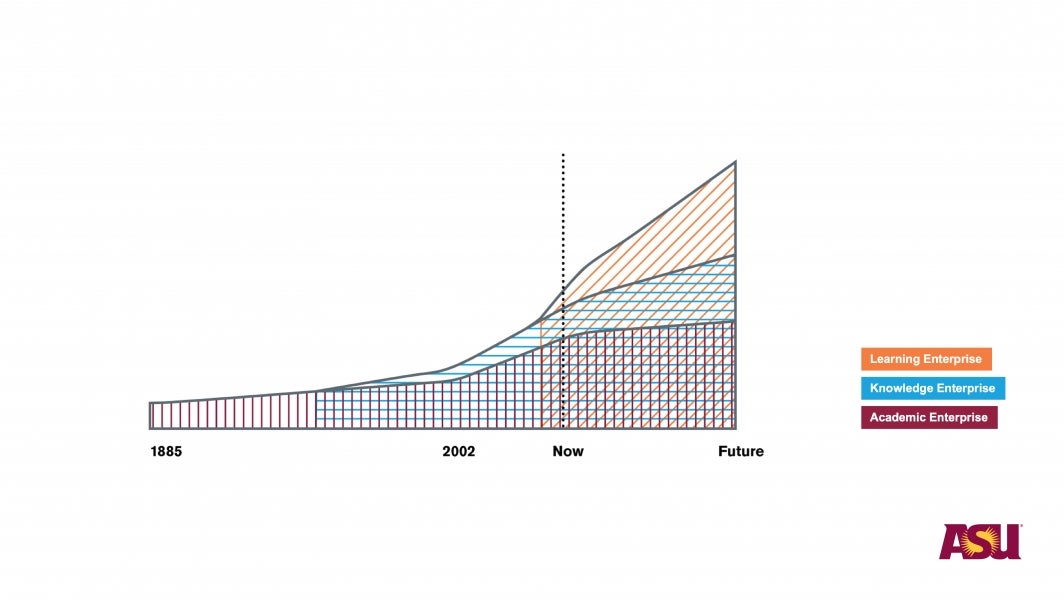Broadening access to higher education. Advancing research that helps people. Taking responsibility for the communities it serves.
These are promises laid out in Arizona State University’s charter, and now — to better fulfill those promises — they are the three “pillars” around which the university will organize its efforts going forward.
The Academic, Knowledge and Learning enterprises are all led by women:
- Nancy Gonzales has been named as the university’s next executive vice president and university provost and will begin her tenure leading the Academic Enterprise on July 1. The Academic Enterprise encompasses everything to do with degree-seeking students and the faculty who teach them.
- Sally C. Morton began serving as executive vice president of ASU’s Knowledge Enterprise on Feb. 1. The Knowledge Enterprise advances research, corporate engagement, economic development, entrepreneurship, international development, and technology transfer.
- Maria Anguiano was named executive vice president of ASU’s Learning Enterprise in December 2020. The Learning Enterprise is ASU’s lifelong learning ecosystem, designed for all learners no matter what stage of life (outside of those seeking degrees) — from kindergartners to mid-career professionals to retired people.
The Learning Enterprise is especially relevant for people who never knew that ASU had resources for them. It includes such resources like ASU Prep Digital, an online charter school for K–12 students, professional development courses such as Six Sigma, and the Osher Lifelong Learning Institute, a program in which ASU faculty teach short, noncredit courses to adults over 50, just to name a few.
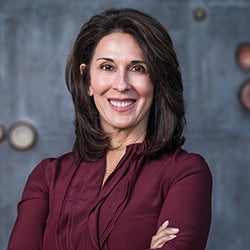
Nancy Gonzales
Gonzales said the new reorganization represents the true power of ASU.
“The three pillars will enable us to realize our charter and the way in which we are not just a traditional institution of learning. We are also a knowledge-generating institution where we use our educational assets, discoveries and creativity to take responsibility for the public we serve,” she said.
“And reaching out to learners beyond the traditional college student is a fundamentally important aspect of our mission.”
Academic Enterprise
The Academic Enterprise at ASU has expanded access to higher education for more students through initiatives such as ASU Online and easier transfer pathways from community colleges, Gonzales said.
“But it’s not just about increasing enrollment; it’s about student success and a student-centric commitment to meet the varied learning styles, circumstances, and needs of our students,” she said.
Graduating students who are prepared for the opportunities and challenges they will face in the workfoce has been a core aspect of ASU’s mission, with supports such as adaptive learning and experiential learning.
“It’s also important that we serve a diverse student population, and this requires us to evolve our curriculum so it offers equal access, inclusion and a sense of belonging to all students ” she said.
An illustration of the trajectory of ASU's Academic Enterprise.
Knowledge Enterprise
The Knowledge Enterprise oversees ASU’s research, which had more than $640 million in research expenditures in fiscal year 2019 and $673 million in FY 2020, as well as 135 patents and 19 startup companies in 2020. Knowledge Enterprise is ASU’s purposefully designed engine for scaling innovation and advancing technology to drive impact.
“Our goal in Knowledge Enterprise is to foster use-inspired research, which fundamentally means we focus on research that answers questions of importance to our community,” Morton said.
“That doesn’t preclude basic research, down to the molecules. We are always intellectually curious. That knowledge feeds into use-inspired research.”
One of ASU’s design aspirations is “social embeddedness.”
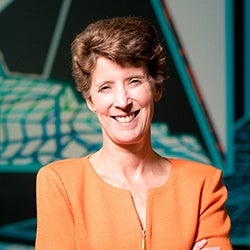
Sally C. Morton
“Often as researchers, we were taught to tell the community, ‘We know what you need.’ That’s the wrong way to go about serving ASU’s charter,” said Morton.
“We want to hear — really hear — the questions that the community is interested in, and research them in a full-circle way that brings the research back to the community.”
Morton, who came from Virginia Tech, is a statistician.
“At the land-grant university where I worked previously, we would think about agricultural crops. I say data are the new crop and we have to understand how to gather that crop and make it useful.
“Data by itself aren’t of any use. It’s how we translate those data into information that people can use.”
Knowledge Enterprise is also focused on transdisciplinary research, gathering experts across many fields to tackle complex problems. This transdisciplinary approach is embraced at the student level — for example, at the student-led Luminosity Lab — up to the space-travel level, where astrophysicists, artists and engineers are collaborating on the Interplanetary Initiative.
Recently, Knowledge Enterprise gathered researchers from across the university to think about artificial intelligence in national security.
“The conversation covered everything from the methodological work on algorithms, such as how we validate them, how they work, for example with respect to facial recognition,” Morton said. “Legal matters are important, regulatory issues, social science aspects. There are ethical and equity issues around AI. How do we communicate all this? It will impact all of us even if we don’t know about it and understand it.”
Knowledge Enterprise embraces the interconnectedness of the three pillars, Morton said.
The growth of the Academic Enterprise along with the Research Enterprise.
Learning Enterprise
The Learning Enterprise is a new initiative that will serve people across their life span, said Anguiano, who will take the lead on harnessing all of ASU’s learning assets to give everyone a chance to expand their enhance their social, economic and academic opportunities.
“We’re a lifelong-learning ecosystem that will be technology-enabled integrating all of ASU’s assets, making it easy for a learner to plug in and find resources relevant to them,” she said.
Learning Enterprise also focuses on creating a variety of pathways into ASU’s degree programs through assets such as ASU’s Universal Learner Courses, which allow people to try out college classes, earn credits at a lower cost and pay only if they pass.
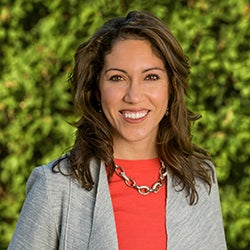
Maria Anguiano
“We are breaking the rigidity of higher education and creating a variety of pathways into degree programs for learners that need more flexibility than the current system allows ,” Anguiano said.
“We want ASU to be a community resource for every learner and for folks to see themselves connected to ASU throughout their lives.”
Many people have already earned a degree and worked for years in a career before finding out they need new skills in a rapidly changing workplace — or a different career altogether. Continuing and Professional Education in ASU’s Learning Enterprise offers more than 250 courses, in person and online, in topics such as marketing, sustainability, organizational diversity, health care and communication. Some lead to credentials, including data analytics, small business management and Six Sigma.
The Learning Enterprise will incorporate many programs that have existed at ASU for years, such as the Osher Lifelong Learning Institute, and create new ones. For example, ASU Local will be a network of sites where ASU Online students can gather in their own communities to study together and share Sun Devil experiences. Current ASU Local sites are the ASU California Center in downtown Los Angeles, opening in the fall semester, and the ASU Barbara Barrett and Sandra Day O’Connor Washington Center in the nation’s capital. Several more ASU Local sites are planned.
Activating the charter means engaging people who never realized that they could be part of the ASU community. Learning Enterprise offers enrichment for the community at large, from free personal-development courses in topics such as space missions, climate research and entrepreneurship to Mirabella at ASU, an intergenerational living and learning complex near the Tempe campus.
Adding the Learning Enterprise means a wider expanse of education opportunities going forward.
“Learning happens everywhere, and it happens with groups of people, so we want to create a learning experience that highlights that — the facilitation of people coming together, solving problems and being engaged in community, civic and intercultural learning,” Anguiano said.
“We want people engaged in learning for the fun of it and for the love of it.”
Find more of the Learning Enterprise’s offerings at the ASU for You website.
Top photo illustration by ASU Media Relations and Strategic Communications. Graphics by Chad Musch/ASU.
More Arts, humanities and education

ASU’s Humanities Institute announces 2024 book award winner
Arizona State University’s Humanities Institute (HI) has announced “The Long Land War: The Global Struggle for Occupancy Rights” (Yale University Press, 2022) by Jo Guldi as the 2024…

Retired admiral who spent decades in public service pursuing a degree in social work at ASU
Editor’s note: This story is part of coverage of ASU’s annual Salute to Service.Cari Thomas wore the uniform of the U.S. Coast Guard for 36 years, protecting and saving lives, serving on ships and…

Finding strength in tradition
Growing up in urban environments presents unique struggles for American Indian families. In these crowded and hectic spaces, cultural traditions can feel distant, and long-held community ties may be…
